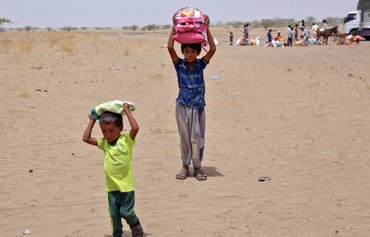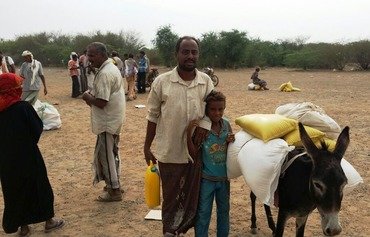UN humanitarian co-ordinator Lise Grande on Wednesday (July 8th) warned that Yemen is once again on the brink of famine, as donor funds that averted catastrophe just 18 months ago have dried up.
The ongoing war and the novel coronavirus (COVID-19) pandemic have triggered new waves of displacement and rising food prices.
Yemen is already gripped by what the UN calls the world's worst humanitarian crisis, with tens of thousands killed, an estimated four million people displaced by war and 80% of its 29 million people dependent on aid for their survival.
In an interview from Sanaa, Grande told AFP that critical programmes providing sanitation, healthcare and food were already closing down because of a lack of cash, just as the economic situation is looking "scarily similar".
A critical fuel shortage, for which the Iran-backed Houthis (Ansarallah) and the government are trading blame, is now threatening the operation of the electricity grid, water supply, and key infrastructure like hospitals.
"Ships are not being allowed to bring in life-saving commodities, the currency is depreciating very quickly. The central bank is out of money. The price of a basic food basket... has increased by 30% in just the past few weeks alone," she said.
Rising price of food
By late June, the cost of the "minimum food basket" -- what an average family would need to survive for one month -- had risen by as much as 35% in some areas, the UN Office for the Co-ordination of Humanitarian Affairs (OCHA) said.
At the same time, the purchasing power of the Yemeni riyal has fallen.
The food basket includes wheat flour, beans, cooking oil, salt and sugar, along with hand-washing soap, laundry detergent, sanitary napkins and water.
According to the Food and Agriculture Organisation (FAO), the cost of the food basket rose by 36% in Sanaa, 12% in Lahj, 10% in Taez and 10% in Socotra, as the pandemic impacted prices in Yemen and the cost of imported food.
The FAO said it expects food prices to continue to rise until at least September, mostly due to the continued depreciation of the currency.
"The rise in the price of the food basket in Yemen is the result of five years of war," Studies and Economic Media Centre chairman Mustafa Nasr told Al-Mashareq.
The purchasing power of the Yemeni riyal has fallen amid "the oil derivative crisis and other economic challenges brought on by the war", he said.
According to the International Organisation for Migration (IOM), more than 100,000 people have been displaced in Yemen since the beginning of this year due to the fighting and the coronavirus outbreak.
Impact of the conflict
The combatants have acted "without respect for international humanitarian law that urges parties to conflicts to protect civilians and provide the necessary services", said lawyer and human rights activist Huda al-Sarari.
The conflict does not justify "the failure and negligence of the parties to the conflict to fulfill their obligations towards the citizens in the areas under their control, especially in view of the COVID-19 pandemic", she told Al-Mashareq.
Yemen lacks the ability to implement the health measures needed to tackle the virus, she said, which was one of the causes of displacement in some areas.
The massive wave of displacement "reflects the impact of the conflict and military clashes, and of the coronavirus outbreak", Deputy Minister of Human Rights Nabil Abdul Hafeez told Al-Mashareq.
"The number of internally displaced persons (IDPs) totals about four million, an enormous number that necessitates the redoubling of efforts on the part of UN organisations to help them and alleviate their suffering," he said.
A parallel effort to foster peace is also needed, he added.
One of the war's human tragedies is the scale of the displacement in Yemen, Nasr said.
Aiding the displaced population must be "a priority for all sides" in light of the high cost of living and growing number of IDPs, he said.

![A medic examines a Yemeni child suffering from malnutrition at a treatment centre in Yemen's northern Hajjah province on July 5th. [Essa Ahmed/AFP]](/cnmi_am/images/2020/07/09/24875-Yemen-Hajjah-UN-600_384.jpg)






